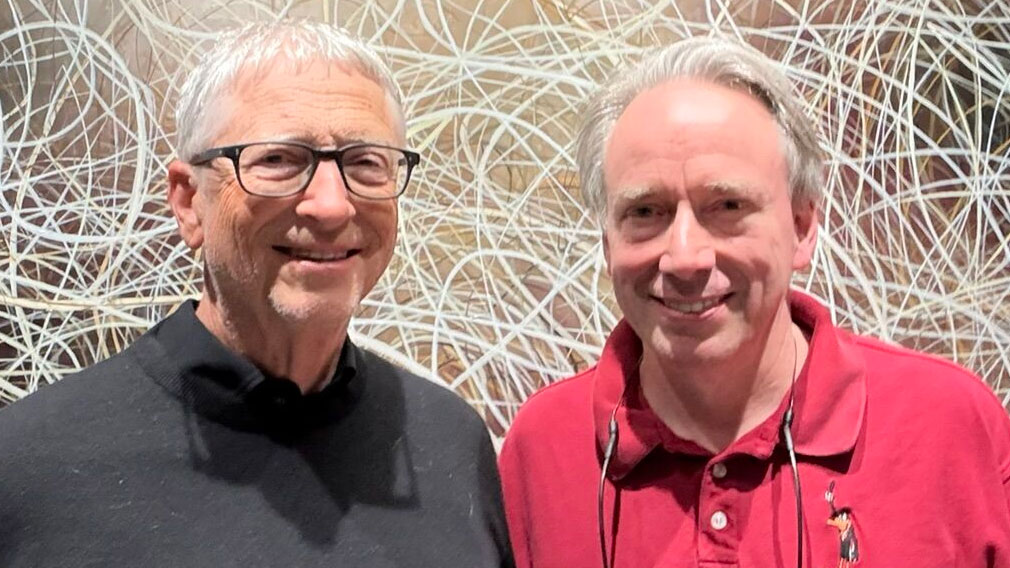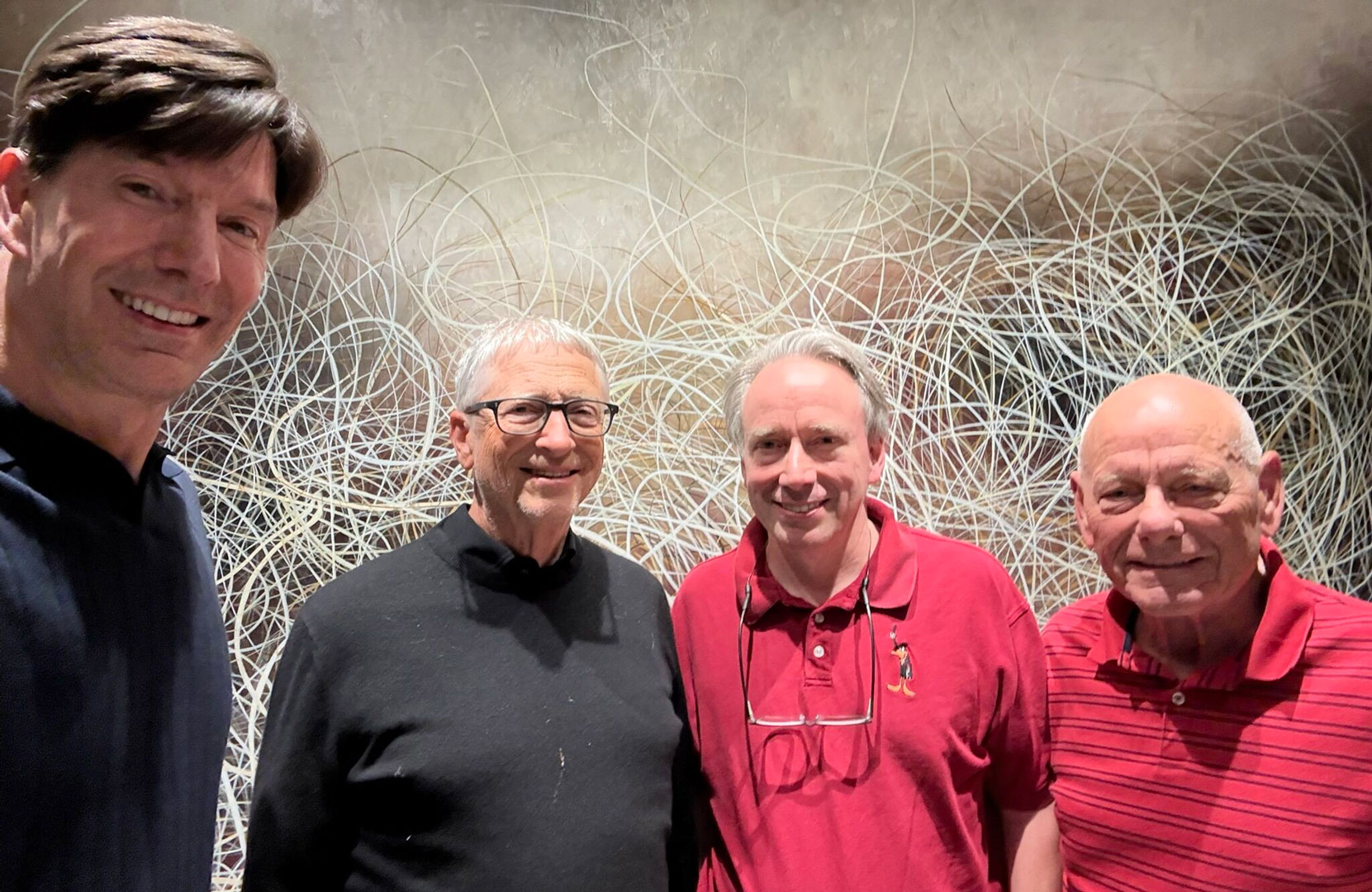Long-time rivals Bill Gates and Linus Torvalds meet for the first time, have dinner — 'No major kernel decisions were made, but maybe next dinner'
It is quite a surprise that the kingpins behind Windows and Linux never met previously.

An extraordinary image has been shared on LinkedIn, capturing the first meeting between two legends of the tech world. In the center of the group photo, you can see Bill Gates and Linus Torvalds standing shoulder-to-shoulder - or actually they look more friendly than that. The happy pair, well known for their contrasting philosophies on the business of software, were enjoying the company of Microsoft Fellows Mark Russinovich (left) and David Cutler (right).

It is rather surprising that the kingpins behind Windows and Linux had never met previously, but we will take the host’s, Russinovich’s, word for it. Time usually mellows a man, and perhaps putting these two together at the same table would have been a recipe for trouble in decades past.
“I had the thrill of a lifetime, hosting dinner for Bill Gates, Linus Torvalds and David Cutler,” wrote Russinovich on LinkedIn. “Linus had never met Bill, and Dave had never met Linus. No major kernel decisions were made, but maybe next dinner ;)”
Many social media commenters were also taken aback by the mass of computer technology talent squeezed into one frame. The concentration of power, influence, and legacies might be off the scale for one photo. Some also pondered over what the tech world would be like now, if not for these men.
It would have been fascinating to be a fly on the wall at the dinner. Did the collected tech titans analyze and dissect matters in the field of tech? Or perhaps they went down the light and trivial conversational route, with tech topics sidelined by an unspoken consensus? We can only speculate.
Two worlds collide, a potted history
Bill Gates became an IT industry legend as the co-founder of Microsoft. He was pivotal to pioneering commercial software and personal computing ecosystems development from the mid-1970s onwards.
Gates stayed at the helm of Microsoft well into the heydays of Windows, but is now most famous for his charitable works. His comments on the tech industry can still stoke headlines, though. Recently, he was in the news for predicting the death of many careers at the hands of AI. He also seems to miss the 'brave' Pat Gelsinger’s leadership at Intel.
Get Tom's Hardware's best news and in-depth reviews, straight to your inbox.
Linus Torvalds released the first version of the open-source Linux kernel back in September 1991. This non-commercial approach to advancing computing, especially software, contrasts with that of Gates and Microsoft. However, even though the rival Windows OS costs money and is openly derided in tech circles, the year of Linux hasn’t yet arrived.
Torvalds has a reputation for being a tech industry firebrand. In contrast with Gates’ take on AI, he considers it to be “90% marketing.” He also doesn’t seem to care about inflicting friendly fire damage on members of the Linux community, recently publicly raging against the “random turd files” he found in Linux 6.15-rc1.
Follow Tom's Hardware on Google News to get our up-to-date news, analysis, and reviews in your feeds. Make sure to click the Follow button.

Mark Tyson is a news editor at Tom's Hardware. He enjoys covering the full breadth of PC tech; from business and semiconductor design to products approaching the edge of reason.
-
Findecanor For those who didn't know: Dave Cutler was head of the team at Microsoft who developed the Windows NT kernel, which is the foundation for MS-Windows today. Before that he had worked on VMS at DEC.Reply
IMHO, getting kernel heavyweights Linus and Dave together is a bigger deal than Linus and Bill Gates meeting. -
abufrejoval Reply
You beat me to it ;)Findecanor said:For those who didn't know: Dave Cutler was head of the team at Microsoft who developed the Windows NT kernel, which is the foundation for MS-Windows today. Before that he had worked on VMS at DEC.
IMHO, getting kernel heavyweights Linus and Dave together is a bigger deal than Linus and Bill Gates meeting.
Just what I wanted to say, too!
WNT = V++M++S++ has always been a source of rumours about just how much Windows NT was in fact VMS in new clothes.
But then WNT 4 went against what I'd say was one of Dave Cutlers main principles and had drivers run in kernel mode, rather than a less privileged mode to support GUI on VGA with reasonable performance. NT 3 and 3.5 had them run outside ring 0 and thus could survive a broken driver much better.
Down went the VMS stability because now some deskjet printer driver would bring down a multi-user terminal server because it wasn't thread-safe and dual CPU x86 became a thing. -
Findecanor Reply
Oh, I've never considered that.abufrejoval said:WNT = V++M++S++ has always been a source of rumours about just how much Windows NT was in fact VMS in new clothes.
There is the same relationship between "IBM." and "HAL.".
The story about IBM and HAL in Arthur C. Clarke's movie+book "2001 - a Space Odyssey" is a bit peculiar.
In the movie, the misbehaving HAL computer had been made at the "HAL factory" in Urbana-Campaign.
In the real world, at the University at Urbana-Campaign, there used to be a tradition among engineering students to name their projects "HAL", the joke being to "one-up IBM".
IBM had product-placement in the movie, so they were a little annoyed when the movie came out.
A company formed by alumni was named "HAL Communications", and received many prank calls after the movie.
Arthur C. Clarke claimed ignorance to the whole naming debacle, saying it was all a coincidence. -
QuarterSwede Reply
Oh that’s funny.Findecanor said:Oh, I've never considered that.
There is the same relationship between "IBM." and "HAL.".
The story about IBM and HAL in Arthur C. Clarke's movie+book "2001 - a Space Odyssey" is a bit peculiar.
In the movie, the misbehaving HAL computer had been made at the "HAL factory" in Urbana-Campaign.
In the real world, at the University at Urbana-Campaign, there used to be a tradition among engineering students to name their projects "HAL", the joke being to "one-up IBM".
IBM had product-placement in the movie, so they were a little annoyed when the movie came out.
A company formed by alumni was named "HAL Communications", and received many prank calls after the movie.
Arthur C. Clarke claimed ignorance to the whole naming debacle, saying it was all a coincidence. -
Stomx First of them failed at creating good server OS, and second good Desktop one. So the third guy is still clearly missing here.Reply -
abufrejoval Reply
I'm not aware that Bill Gates ever created any OS, not even DOS. AFAIK he never graduated beyond BASIC interpreters.Stomx said:First of them failed at creating good server OS, and second good Desktop one. So the third guy is still clearly missing here.
And Linus wasn't into desktops, but multi-tasking kernels. His first sucked really bad, using Intel hardware task state segments for process switching, which was terrible, but today everbody else's kernels perform much worse.
But I appreciate you're trying to make a joke.
So what could be the third?
A mobile OS? Or an OS that actually doesn't think it's God but is happy to be distributed, social and still loyal to the owner(s) instead of the vendor?
Yeah, still missing! -
bit_user Reply
I think that's not fair. Linus speaks his mind and doesn't waste time or energy on sugar coating his message, when it comes to the nuts-and-bolts business of maintaining the huge undertaking that is the Linux Kernel. However, I haven't seen him be vindictive or nasty just for the sake of being mean or as a power move.The article said:Torvalds has a reputation for being a tech industry firebrand. In contrast with Gates’ take on AI, he considers it to be “90% marketing.” He also doesn’t seem to care about inflicting friendly fire damage on members of the Linux community, recently publicly raging against the “random turd files” he found in Linux 6.15-rc1.
Bill Gates is also very direct and plain-spoken, though I think Bill has a fierce competitive streak I haven't noticed in Linus.
The author also probably should've mentioned that Microsoft has had an official Linux distro (now called Azure Linux), since about 5 years ago. Oh, how times have changed!
https://en.wikipedia.org/wiki/Azure_Linux
BTW, it was really Steve Ballmer who put Linux in the crosshairs and it was really Microsoft that targeted Linux. Linux, itself, wasn't ever really anti-Microsoft, it was just doing its own thing. Sure, some of Microsoft's competitors have jumped on the Linux bandwagon, along the way, but Linux never defined or constrained itself to being anti-Microsoft.
P.S. I know Linus lives in the Pacific Northwest, though I forget exactly where. I wouldn't be surprised if he didn't live all that far from Bill Gates. -
bit_user Oh, and I'd be pretty shocked if they got into any ideological discussions about software or anything else. Perhaps some technical anecdotes were shared, but I'm sure all present are mature enough not to sour the mood by making some screed or voicing a position others would likely challenge. Plus, they're all smart enough to know that doing so would have no upside.Reply
I'd bet the overall tenor was more that of some old men sharing war stories than having any vigorous debates over anything but the most trivial sorts of subjects. -
Alvar "Miles" Udell The "Year Of Linux" won't arrive until a significant percentage of people can sit down at a Linux machine and use all the software they need the way they can with Windows and Mac. It's getting there, gaming focused machines will be the first, but it's still a long way off.Reply -
bit_user Reply
I don't know why people still even talk about it like it's going to be some sort of overnight revolution. It won't be. In the best case scenario, Linux usage will simply continue to increase and it'll get more accessible, but I don't foresee a "tipping point".Alvar Miles Udell said:The "Year Of Linux" won't arrive ...